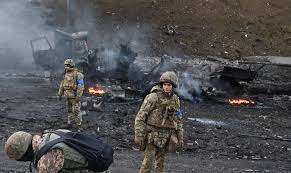Following Vladimir Putin’s invasion of Ukraine two years ago, more than three dozen countries, led by the West, imposed economic sanctions on Russia. These sanctions were unprecedented in their scope for a target of its size, covering energy, finance, technology, travel, shipping, and more. Their aim was to raise the cost to Russia of continuing the war.
The reorganization of trade that has followed highlights the relentless eastward shift in the world’s economic center of gravity. Asia accounts for two-fifths of the world’s GDP. Its ever-increasing commercial pull is diverting much trade that Russia previously conducted with the West, undermining sanctions. That is despite the fact that three of the six Asian countries that have joined the sanctions—Japan, Australia, and South Korea—number among the region’s five biggest economies. America should bear this in mind if it ever considers slapping similar sanctions on China.
The Scale and Scope of Sanctions
Unprecedented Measures
The economic sanctions imposed on Russia were vast in their scale and scope. They targeted vital sectors including energy, commodities, finance, technology, travel, and shipping. These measures aimed to cripple Russia’s economy and force a reconsideration of its actions in Ukraine.
Energy Sector Impact
Sanctions on Russia’s energy sector aimed to cut off one of its largest revenue streams. This included restrictions on oil and gas exports, which had a significant impact on global energy markets.
Financial Restrictions
Financial sanctions targeted Russian banks and financial institutions, limiting their ability to operate internationally. This restricted access to global capital and financial services.
Technological Embargoes
Technological sanctions included restrictions on exports of high-tech products to Russia, aiming to hamper its technological advancements and military capabilities.
The Shift in Global Trade Dynamics
Asia’s Growing Economic Influence
The sanctions on Russia have accelerated the shift in global economic power towards Asia. Asia now accounts for two-fifths of the world’s GDP, making it a significant player in global trade.
Russia’s Pivot to the East
With traditional Western markets closed, Russia has increasingly turned to Asia for trade partnerships. This includes expanding trade relations with China, India, and other Asian countries.
Impact on Western Economies
The reorganization of trade has not only affected Russia but also had implications for Western economies. The loss of Russian markets has forced Western companies to seek new opportunities and adapt to changing trade dynamics.
Undermining the Sanctions
Asia’s Role in Sanctions Evasion
Despite the sanctions, Russia has found ways to continue its trade through Asian intermediaries. This includes rerouting goods and services through countries not participating in the sanctions.
Economic Interdependence
The economic interdependence between Russia and certain Asian countries has made it challenging to fully enforce the sanctions. These countries benefit from Russian trade and are reluctant to sever these ties completely.
Lessons for Future Sanctions
Consideration of Economic Shifts
The situation with Russia highlights the importance of considering global economic shifts when imposing sanctions. The growing influence of Asia means that future sanctions must account for these dynamics.
The China Factor
If the West ever considers imposing similar sanctions on China, it must be mindful of China’s significant role in the global economy. Sanctions on China could have far-reaching implications, given its deep integration into global trade networks.
Strategic Alliances
Building strategic alliances with key global players, including those in Asia, will be crucial for the effectiveness of future sanctions. This will help ensure a united front and minimize the avenues for sanctions evasion.
The economic sanctions on Russia following its invasion of Ukraine have reshaped global trade dynamics, emphasizing Asia’s growing economic influence. While the sanctions aimed to cripple Russia’s economy, the reorganization of trade has highlighted the challenges in enforcing such measures in a globally interconnected world. Future sanctions must consider these shifts and the intricate web of global economic relationships to be truly effective.




